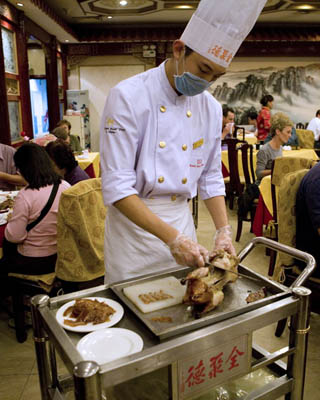Economy
Restaurants lick their lips as festival approaches
(China Daily)
Updated: 2011-01-24 16:59
 |
Large Medium Small |
|
 |
|
A chef carves thin slices of meat from a roast duck at a branch of Quanjude Restaurant in Beijing. [Photo/Bloomberg] |
BEIJING - Catering will boom during the Chinese Spring Festival, experts said after researching dinner reservations for the lunar New Year's Eve on Feb 2.
Wang Ruihua, vice-general secretary of the Beijing Dining Industry Association, said the trend of more people going out to eat on China's New Year's Eve reflected figures from last year. Based on a survey conducted of hundreds of restaurants in Beijing's 21 streets where famous eateries are clustered, most are already 80 percent booked for the year's most important meal for Chinese families.
Holiday villages in the suburban areas of big cities are also regarded as good venues in a trend that has developed in recent years. According to a report on the 100 most-liked restaurants for New Year's Eve dinner in 2010 compiled by Beijing municipal commission of commerce, 52 percent were outside the city.
Data from the commission also showed sales of the 369 restaurants polled during the 2010 week-long holiday increased by 23.84 percent year-on-year, the highest rate since 2007. The commission will release the new data for 2011 in early February.
The Spring Festival holiday is a traditional peak business time for restaurants. Last year, sales in Anhui province had the highest growth rate at 48.3 percent among all provinces. Liaoning, Jiangxi, Shandong and Chongqing also increased by around 20 percent, data from the Ministry of Commerce shows.
To solve a shortage in available dining tables, restaurants have reduced the average time for meals to two hours in the evening. Those who cannot book a table for the Spring Festival evening dinner can take away dishes and eat at home. In Shaanxi province this business grew by 30 percent.
"Most restaurants have divided the evening dining time into two sittings - 4 pm to 6 pm and 6 pm to 8 pm," said Shi Wanrong, director of the China Cuisine Association, who also owns a restaurant in Beijing. "We opened bookings at the end of National Day in early October this year and were fully booked before the start of 2011."
Many people who regularly cook evening meals at home have found that vegetables and meat have become much more expensive. It is not cheap anymore for them to prepare a solid meal at home, Shi added.
"Generally speaking, restaurant reservations and sales during Spring Festival are about three times normal levels. For instance, in my restaurant's 150-square-meter place, we can earn about 80,000 to 90,000 yuan a day during the holiday while usually we make 20,000 to 30,000 yuan on the other days of the year."
Based on the latest online survey by the China Cuisine Association in 2010, the majority of customers said they will eat out this Spring Festival. More than half of the participants said their budget for dinner is between 500 and 1,200 yuan. About 25 percent are willing to spend more than 1,200 yuan while the rest plan to spend less than 500 yuan.
Well-known restaurants are mostly favored by more than 31.5 percent people taking part in the survey. The dining environment was considered more important than the price for 30 percent of people.
| 分享按鈕 |



